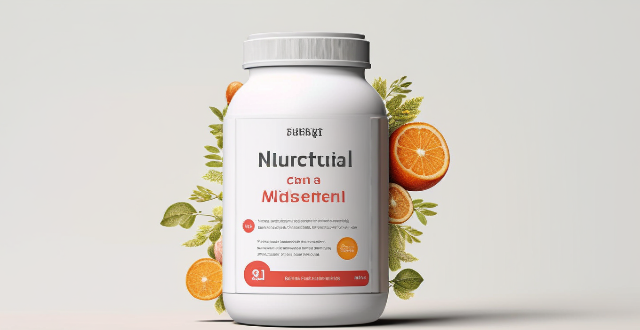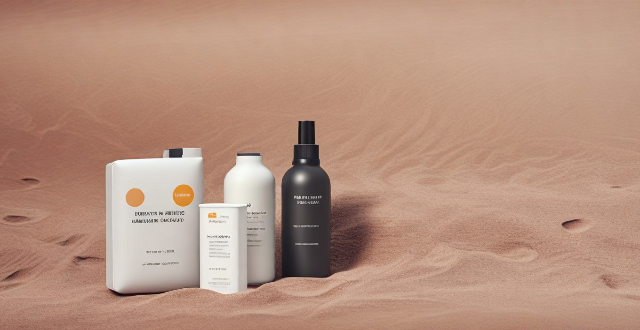Muscle Supplement

Can sports supplements help with muscle recovery after workouts ?
Can Sports Supplements Help with Muscle Recovery After Workouts? Physical exercise and workouts are essential for maintaining a healthy lifestyle, but they can also lead to muscle fatigue and soreness. Many athletes and fitness enthusiasts turn to sports supplements to aid in muscle recovery after workouts. But do these supplements really work? Let's explore the topic in detail. What are Sports Supplements? Sports supplements are dietary products designed to enhance athletic performance, improve physical health, and support recovery from exercise. They come in various forms, including powders, pills, and liquids, and can be consumed before, during, or after workouts. Types of Sports Supplements - Protein Powders: Help in muscle repair and growth. - Creatine: Boosts energy production in muscles. - Branched-Chain Amino Acids (BCAAs): Support muscle building and recovery. - Glutamine: Aids in muscle recovery and immune function. - Omega-3 Fatty Acids: Reduce inflammation and promote heart health. - Multivitamins/Minerals: Support overall health and wellness. How Do Sports Supplements Help with Muscle Recovery? - Protein Powders: Consuming protein powders after a workout can help replenish depleted amino acids, leading to faster recovery times. - Creatine: Increases the availability of phosphocreatine, which helps regenerate ATP more quickly during high-intensity exercises, reducing muscle fatigue and aiding in recovery. - BCAAs: Consuming BCAA supplements before or during workouts can reduce muscle damage and speed up recovery processes. - Glutamine: Supports muscle recovery by helping maintain cellular volume and preventing muscle breakdown. It also supports immune function, which is important for overall health and recovery. - Omega-3 Fatty Acids: Have anti-inflammatory properties that can help reduce muscle soreness and stiffness after workouts. They also support heart health, which is crucial for athletes who engage in cardiovascular exercises. - Multivitamins/Minerals: While not directly related to muscle recovery, consuming multivitamins or minerals can support overall health and wellness, which indirectly aids in recovery processes. Are Sports Supplements Safe? While sports supplements can be beneficial for some individuals, it's important to note that they are not regulated by the Food and Drug Administration (FDA). This means that their safety and effectiveness may vary between brands and products. It's always best to consult with a healthcare professional before starting any supplement regimen. Additionally, relying solely on supplements without proper nutrition and rest can be counterproductive. A balanced diet, adequate sleep, and proper hydration are still key components of effective muscle recovery.

How do sports nutrition supplements affect muscle recovery after a workout ?
Sports nutrition supplements can significantly support muscle recovery post-workout by providing essential nutrients. Protein supplements like whey and casein replenish amino acids, while carbohydrate supplements such as BCAAs and beta-alanine reduce soreness and fatigue. Other nutrients, including creatine, glutamine, and vitamins/minerals, further enhance recovery. A structured supplementation routine, tailored to individual needs, can optimize muscle recovery and athletic performance.

How do I choose the right sports nutrition supplement for my specific sport or activity ?
When it comes to sports nutrition, supplements can playWhen it comes to sports nutrition, supplements can play performance, recovery, and overall supplements can play a crucial role in enhancing performance, recovery, and overall health. However, with so many options available on the market, it can be challenging to determine which supplement is best suited for your specific sport or activity. Here are some tips to help you make an informed decision: - Identify Your Goals: Before choosing a sports nutrition supplement, it's essential to identify your goals. Are you looking to increase endurance, build muscle, lose weight, or improve recovery? Different supplements are designed to address different needs, so understanding your objectives will help you narrow down your options. - Research the Types of Supplements Available: There are various types of sports nutrition supplements, including protein powders, amino acids, creatine, beta-alanine, and pre-workout formulas. Each type of supplement has its unique benefits and drawbacks, so it's crucial to research each option thoroughly before making a decision. - Consider Your Dietary Needs: Your dietary needs play a significant role in determining which sports nutrition supplement is right for you. For example, if you're following a plant-based diet, you may need to look for vegan-friendly supplements that provide essential nutrients like iron, calcium, and vitamin B12. Additionally, if you have any food allergies or sensitivities, it's important to check the ingredients list of potential supplements to ensure they don't contain any allergens. - Evaluate Brand Reputation and Quality Assurance: Not all sports nutrition supplements are created equal. It's crucial to choose a reputable brand that prioritizes quality assurance and third-party testing. Look for brands that are transparent about their manufacturing processes and ingredient sourcing. Reading customer reviews and seeking recommendations from other athletes or coaches can also help you make an informed decision. - Consult with a Healthcare Professional: Before starting any new supplement regimen, it's always a good idea to consult with a healthcare professional, such as a registered dietitian or sports medicine physician. They can provide personalized advice based on your individual needs and help you avoid potential interactions with medications or existing health conditions. - Start with Small Doses and Monitor Effects: Once you've chosen a sports nutrition supplement, start with small doses and monitor how your body responds. Pay attention to any changes in energy levels, recovery time, or overall performance. If you experience any adverse effects or don't notice any improvements after several weeks, consider trying a different supplement or adjusting your dosage. In conclusion, choosing the right sports nutrition supplement requires careful consideration of your goals, dietary needs, and individual preferences. By researching your options, evaluating brand reputation, consulting with healthcare professionals, and monitoring your body's response, you can find a supplement that supports your specific sport or activity and helps you achieve optimal performance.

What are the best sports nutrition supplements for enhancing athletic performance ?
The article discusses the importance of sports nutrition supplements in enhancing athletic performance. It highlights five key supplements that can help athletes improve their performance: 1. Protein Supplements: Essential for building and repairing muscles, protein supplements like whey, casein, and soy protein can support muscle growth, increase strength, and improve body composition. 2. Creatine Supplements: Popular among athletes for increasing muscle mass and improving performance during short, high-intensity exercise. Creatine also enhances recovery between workouts. 3. Beta-Alanine Supplements: An amino acid that increases muscle carnosine levels, beta-alanine can improve endurance capacity during high-intensity exercise, reduce fatigue, and enhance muscle strength and power. 4. Caffeine Supplements: A natural stimulant that can increase energy levels, reduce fatigue, improve mental focus, and enhance endurance capacity during prolonged exercise. 5. Multivitamins and Minerals Supplements: Important for overall health and well-being, multivitamins and minerals can help prevent nutrient deficiencies that could impair performance and enhance immune function and recovery from training. The article emphasizes the importance of choosing safe and effective supplements that meet the specific needs of an athlete and consulting with a healthcare professional or registered dietitian before starting any new supplement regimen.

What are the most popular sports supplements ?
The most popular sports supplements include protein powders, creatine monohydrate, beta-alanine, caffeine, BCAAs, and multivitamins/minerals. These supplements offer benefits such as muscle growth, increased strength, improved endurance, and faster recovery. However, they should not replace a balanced diet and proper training regimen. Consultation with a healthcare professional is recommended before starting any new supplement regimen.

How should I incorporate sports nutrition supplements into my daily routine for optimal results ?
The text provides a comprehensive guide on how to incorporate sports nutrition supplements into your daily routine for optimal results. It starts with understanding the basics of sports nutrition and assessing individual goals and needs. It then discusses different types of supplements, their timing of intake, and how to incorporate them into various parts of the day. The text emphasizes the importance of monitoring and adjusting supplement use based on personal experiences and advises consulting with a professional for personalized advice.

How should I choose the right sports supplement for me ?
When selecting a sports supplement, consider your fitness goals, research ingredients, read reviews, consult professionals, and start with a small dose.

What are the best exercises for building muscle at the gym ?
The article discusses the best exercises for building muscle at the gym, including free weights, machines, and bodyweight exercises. Free weight exercises like squats, deadlifts, and bench press target multiple major muscle groups for overall strength and muscle growth. Machine exercises such as leg press, lat pulldown, and seated row allow for isolation of specific muscles while still allowing heavy lifting. Bodyweight exercises including push-ups, pull-ups, and squat jumps require no equipment and can be done anywhere for convenient muscle building.

Are there any side effects of taking sports supplements ?
Sports supplements can enhance athletic performance and support recovery, but potential side effects include digestive issues from protein supplements, dehydration from creatine, increased heart rate from pre-workout stimulants, cardiovascular risks from weight loss supplements, and overdose risks from multivitamins. It is recommended to consult with a healthcare professional before starting any supplement regimen to ensure safety and effectiveness.

What are the best sports supplements for weight loss ?
Sports supplements can aid in weight loss, but they cannot replace a healthy diet and exercise. Protein powder, pre-workout supplements, fat burners, multivitamins, and fish oil are among the best options. However, it's crucial to use these supplements responsibly and consult with a healthcare professional before starting any new regimen.

How do I prevent muscle soreness after a long run ?
To prevent muscle soreness after a long run, you should warm up properly, stretch your muscles, drink plenty of water, eat a balanced diet, and rest between workouts. Following these tips can help reduce the risk of injury and improve performance in future runs.

Can taking sports nutrition supplements lead to health risks or side effects ?
Sports nutrition supplements can enhance performance and recovery but may pose health risks and side effects such as overdosing, contamination, interactions with medication, and allergic reactions. However, when used appropriately, they can also improve performance, increase muscle mass, aid in recovery, and replenish nutrients. It is crucial to research each supplement, follow recommended dosages, and consult with a healthcare professional to minimize risks and maximize benefits.

What are the benefits of taking sports supplements ?
Sports supplements offer a range of benefits for athletes, from improved performance and faster recovery to optimized nutrition and health maintenance. They can also enhance mental clarity, provide convenience, aid in weight management, and support hormonal balance. It's crucial to consult with a healthcare professional before using any supplements to ensure they are safe and effective for individual needs and goals.

Can sports supplements improve athletic performance ?
Sports supplements claim to enhance athletic performance, but their effectiveness varies. Common types include protein, creatine, pre-workout, BCAAs, and multivitamins/minerals. Some studies support their benefits, especially when used correctly and in conjunction with proper nutrition and training. However, potential downsides include health risks, unproven claims, and high costs. Consult a healthcare professional before using sports supplements to ensure they align with individual goals and health status.

Can stretching after exercise prevent muscle soreness ?
Stretching after exercise can help reduce muscle soreness and improve flexibility, but it is important to wait for enough time, choose appropriate stretches, be mindful of pain, and use proper technique.

Can dehydration really cause muscle cramps during physical activity ?
Dehydration can lead to muscle cramps during physical activity due to loss of essential electrolytes and reduced oxygen supply to muscles. Signs of dehydration include thirst, dark urine, fatigue, dizziness, dry mouth, headache, and constipation. To prevent dehydration and muscle cramps, stay hydrated, eat a balanced diet rich in electrolytes, stretch before and after exercise, gradually increase intensity, and rest when needed.

How does sleep deprivation affect muscle recovery after workouts ?
Sleep is crucial for muscle recovery after workouts, as it allows the body to repair and rebuild damaged muscle tissue. Sleep deprivation reduces growth hormone production and protein synthesis, leading to inefficient muscle recovery. Strategies for improving sleep quality include establishing a consistent sleep schedule, creating a relaxing bedtime routine, avoiding screens before bed, getting plenty of exercise, and creating a comfortable sleeping environment. By prioritizing sleep, you can improve muscle recovery and overall health.

How much protein do I need for muscle recovery ?
Protein is vital for muscle recovery, especially after intense workouts. Sedentary adults need 0.8g/kg, while athletes require more. Timing and quality of protein intake matter. Tips include dietary variety, supplementation if needed, meal planning, and monitoring intake.

What should I eat after a workout to build muscle
After a workout, it is important to provide the body with nutrients for muscle repair and growth. Protein-rich foods like chicken breast and Greek yogurt are essential for muscle growth. Complex carbohydrates like sweet potatoes provide sustained energy. Healthy fats from sources such as avocados and nuts help absorb vitamins. Staying hydrated with water is crucial for muscle function. A balanced diet with fruits, vegetables, and fiber supports long-term muscle health.

How can I prevent muscle soreness after a workout
Stretching, warm-up, hydration, nutrition, rest, massage, ice therapy, and avoiding overtraining are all important steps to help prevent muscle soreness after a workout.

What role does muscle strength training play in preventing chronic diseases ?
Muscle strength training can help prevent chronic diseases such as heart disease, stroke, type 2 diabetes, and some types of cancer. It also has many benefits for physical and mental health, including improved cardiovascular health, weight management, better bone health, reduced risk of type 2 diabetes, enhanced mental health, increased self-esteem, improved physical function, lowered blood pressure, and cancer prevention. To get started with muscle strength training, it is important to start low and slow, mix up your routine, rest enough, stay hydrated, eat right, and get enough sleep. With dedication and consistency, you can achieve great results!

Are there specific supplements recommended for women's health upkeep ?
The article provides a summary of the top supplements recommended for women's health, including Vitamin D, Calcium, Iron, Folic Acid, and Omega-3 Fatty Acids. These supplements support bone health, muscle function, immune function, cardiovascular health, cognitive function, and overall energy levels. The article emphasizes the importance of consulting with a healthcare provider before starting any new supplement regimen to ensure safety and effectiveness.

Is it necessary to stretch every muscle group after a workout ?
Stretching after a workout is often considered an essential part of any exercise routine. It helps in improving flexibility, reducing muscle soreness, and preventing injuries. However, the question remains: is it necessary to stretch every muscle group after a workout? Let's delve into this topic and explore the benefits and considerations associated with post-workout stretching.### Importance of Post-Workout Stretching Improved Flexibility Stretching after a workout can help maintain and improve flexibility over time. When muscles are warmed up from the exercise, they become more pliable, making it easier to stretch them. Regular stretching can lead to increased range of motion and better overall flexibility. Reduced Muscle Soreness Stretching can help reduce muscle soreness that may occur after a strenuous workout. By elongating the muscles, stretching promotes blood flow, which aids in the removal of lactic acid and other waste products that contribute to muscle soreness. Injury Prevention Stretching can also play a role in injury prevention. By increasing flexibility and range of motion, stretching can help reduce the risk of strains, sprains, and other injuries that may occur during physical activity.### Considerations for Post-Workout Stretching Not All Muscles Need to Be Stretched While stretching is generally beneficial, it's not necessary to stretch every muscle group after every workout. The focus should be on the muscles that were primarily engaged during the exercise session. For example, if you completed a lower body workout, it would be more beneficial to stretch your legs rather than your arms. Quality Over Quantity It's important to prioritize the quality of your stretches over the quantity. Performing a few well-executed stretches is more effective than rushing through multiple stretches without proper form or technique. Take the time to hold each stretch for at least 15-30 seconds, ensuring that you feel a gentle stretch without any pain or discomfort. Listen to Your Body Your body will provide clues about which muscles need stretching. If you experience tightness or stiffness in a particular muscle group, it's a good idea to focus on stretching those areas. Conversely, if a muscle group feels loose and relaxed, there may be no need to stretch it extensively.### Conclusion In conclusion, while stretching every muscle group after a workout is not strictly necessary, incorporating stretching into your post-workout routine can offer numerous benefits. By focusing on the muscles that were heavily engaged during your exercise session and prioritizing quality over quantity, you can improve flexibility, reduce muscle soreness, and potentially prevent injuries. Remember to listen to your body and adjust your stretching routine accordingly for optimal results.

Is it necessary to take supplements for sports nutrition ?
Supplements for sports nutrition are a controversial topic, with some athletes swearing by them and others considering them unnecessary or even harmful. The necessity of taking such supplements depends on various factors including an individual's diet, training intensity, and specific goals. Sports nutrition supplements come in various forms like pills, powders, bars, and liquids, and include protein supplements, creatine, beta-alanine, caffeine, BCAAs, pre-workout formulas, and post-workout formulas. While a balanced diet can provide most of the nutrients needed for optimal athletic performance, there are certain situations where supplements may be beneficial. These include inadequate nutrient intake from food alone, high-intensity or endurance training, and specific goals or deficiencies. However, there are also potential risks associated with taking sports nutrition supplements, such as overconsumption and imbalanced nutrient intake, contamination and quality concerns, and interactions with medications or other supplements. Therefore, it is essential to choose reputable brands, check for third-party certifications whenever possible, and consult with a healthcare professional before starting any new supplement regimen. In conclusion, whether or not it is necessary to take supplements for sports nutrition depends on individual circumstances. While they can offer benefits for certain athletes and scenarios, they should not replace a well-rounded diet rich in whole foods. Before incorporating any supplements into your routine, consider your specific needs and goals and consult with a qualified healthcare professional or registered dietitian for personalized advice.

How does exercise affect muscle growth and repair at a cellular level ?
Exercise stimulates protein production for muscle growth and repair, increases satellite cells for new muscle fibers, boosts blood flow for nutrient delivery and waste removal, and promotes the release of growth factors like IGF-1.

Is it possible to build muscle with office-friendly exercises ?
In today's fast-paced world, many people spend a significant portion of their day sitting at a desk. This sedentary lifestyle can lead to various health problems, including muscle loss. However, the good news is that it is possible to build muscle with office-friendly exercises. In this article, we discussed some effective exercises that can be done in an office setting, including bodyweight exercises like push-ups, squats, and lunges, as well as resistance band exercises like bicep curls, tricep dips, and shoulder press. By incorporating these exercises into your routine, you can improve your overall fitness and health while sitting at your desk all day.

What kind of foods should I eat to aid in muscle recovery
Eating a balanced diet that includes carbohydrates, protein, healthy fats, water, and vitamins and minerals is essential for muscle recovery after exercise. Complex carbohydrates provide energy for muscles during recovery, while protein helps repair and grow them. Healthy fats support overall health and reduce inflammation. Drinking enough water flushes out toxins and maintains a healthy fluid balance in the muscles. Vitamins and minerals, such as vitamin C, vitamin D, and iron, are also important for muscle function and recovery.